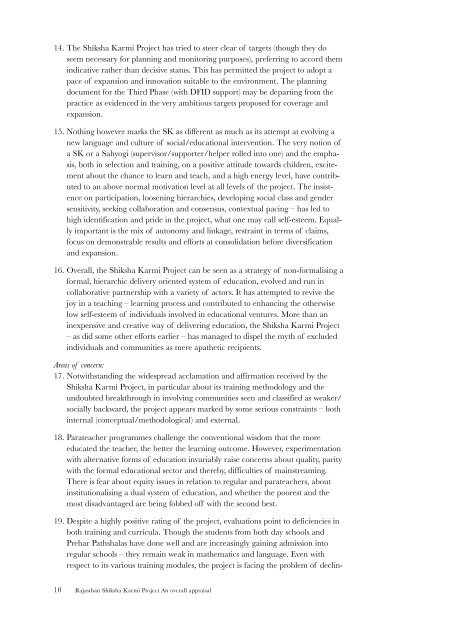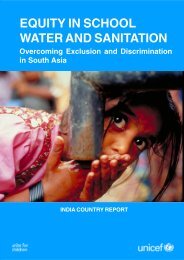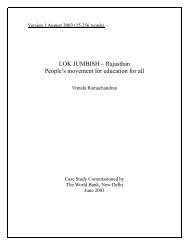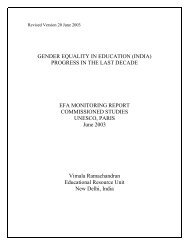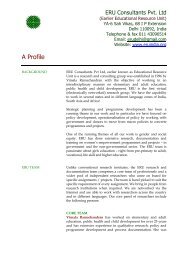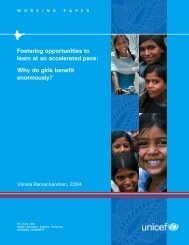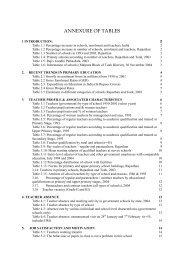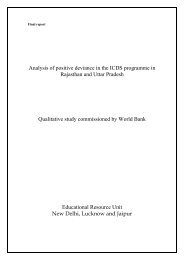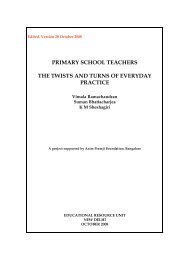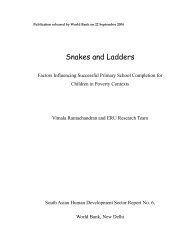Rajasthan Shiksha Karmi Project An overall appraisal
Rajasthan Shiksha Karmi Project An overall appraisal
Rajasthan Shiksha Karmi Project An overall appraisal
You also want an ePaper? Increase the reach of your titles
YUMPU automatically turns print PDFs into web optimized ePapers that Google loves.
14. The <strong>Shiksha</strong> <strong>Karmi</strong> <strong>Project</strong> has tried to steer clear of targets (though they doseem necessary for planning and monitoring purposes), preferring to accord themindicative rather than decisive status. This has permitted the project to adopt apace of expansion and innovation suitable to the environment. The planningdocument for the Third Phase (with DFID support) may be departing from thepractice as evidenced in the very ambitious targets proposed for coverage andexpansion.15. Nothing however marks the SK as different as much as its attempt at evolving anew language and culture of social/educational intervention. The very notion ofa SK or a Sahyogi (supervisor/supporter/helper rolled into one) and the emphasis,both in selection and training, on a positive attitude towards children, excitementabout the chance to learn and teach, and a high energy level, have contributedto an above normal motivation level at all levels of the project. The insistenceon participation, loosening hierarchies, developing social class and gendersensitivity, seeking collaboration and consensus, contextual pacing – has led tohigh identification and pride in the project, what one may call self-esteem. Equallyimportant is the mix of autonomy and linkage, restraint in terms of claims,focus on demonstrable results and efforts at consolidation before diversificationand expansion.16. Overall, the <strong>Shiksha</strong> <strong>Karmi</strong> <strong>Project</strong> can be seen as a strategy of non-formalising aformal, hierarchic delivery oriented system of education, evolved and run incollaborative partnership with a variety of actors. It has attempted to revive thejoy in a teaching – learning process and contributed to enhancing the otherwiselow self-esteem of individuals involved in educational ventures. More than aninexpensive and creative way of delivering education, the <strong>Shiksha</strong> <strong>Karmi</strong> <strong>Project</strong>– as did some other efforts earlier – has managed to dispel the myth of excludedindividuals and communities as mere apathetic recipients.Areas of concern:17. Notwithstanding the widespread acclamation and affirmation received by the<strong>Shiksha</strong> <strong>Karmi</strong> <strong>Project</strong>, in particular about its training methodology and theundoubted breakthrough in involving communities seen and classified as weaker/socially backward, the project appears marked by some serious constraints – bothinternal (conceptual/methodological) and external.18. Parateacher programmes challenge the conventional wisdom that the moreeducated the teacher, the better the learning outcome. However, experimentationwith alternative forms of education invariably raise concerns about quality, paritywith the formal educational sector and thereby, difficulties of mainstreaming.There is fear about equity issues in relation to regular and parateachers, aboutinstitutionalising a dual system of education, and whether the poorest and themost disadvantaged are being fobbed off with the second best.19. Despite a highly positive rating of the project, evaluations point to deficiencies inboth training and curricula. Though the students from both day schools andPrehar Pathshalas have done well and are increasingly gaining admission intoregular schools – they remain weak in mathematics and language. Even withrespect to its various training modules, the project is facing the problem of declin-10 <strong>Rajasthan</strong> <strong>Shiksha</strong> <strong>Karmi</strong> <strong>Project</strong> <strong>An</strong> <strong>overall</strong> <strong>appraisal</strong>


